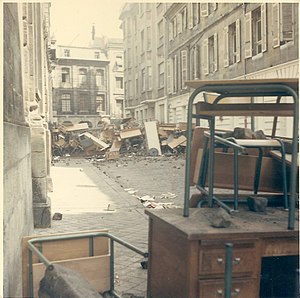
Back Mei 1968-protesaksies in Frankryk Afrikaans أحداث مايو 1968 في فرنسا Arabic Mayu de 1968 en Francia AST 1968-ci ilin may hadisələri (Fransa) Azerbaijani Травеньскія падзеі ў Францыі 1968 году BE-X-OLD Май 68 във Франция Bulgarian Mae 1968 Breton Maig francès Catalan ئایاری ٦٨ CKB Květen 1968 ve Francii Czech
| May 1968 events in France | |||
|---|---|---|---|
| Part of the Protests of 1968 and the Cold War | |||
 Barricades in Bordeaux in May 1968 | |||
| Date | 2 May – 23 June 1968 (1 month and 3 weeks) | ||
| Location | |||
| Methods | Occupations, wildcat strikes, general strikes | ||
| Resulted in | Snap legislative election | ||
| Parties | |||
| Lead figures | |||
| |||
| Casualties | |||
| Death(s) | 2 (only 25 May)[1] | ||
| Injuries | 887+ (only 25 May)[1] | ||
| Arrested | 1,000+ (only 25 May)[1] | ||
| Part of the Politics series on |
| Students' rights |
|---|
Beginning in May 1968, a period of civil unrest occurred throughout France, lasting seven weeks and punctuated by demonstrations, general strikes, and the occupation of universities and factories. At the height of events, which have since become known as May 68 (French: Mai 68), the economy of France came to a halt.[2] The protests reached a point that made political leaders fear civil war or revolution; the national government briefly ceased to function after President Charles de Gaulle secretly fled France to West Germany on the 29th. The protests are sometimes linked to similar movements around the same time worldwide[3] that inspired a generation of protest art in the form of songs, imaginative graffiti, posters, and slogans.[4][5]
The unrest began with a series of far-left student occupation protests against capitalism, consumerism, American imperialism and traditional institutions. Heavy police repression of the protesters led France's trade union confederations to call for sympathy strikes, which spread far more quickly than expected to involve 11 million workers, more than 22% of France's population at the time.[2] The movement was characterized by spontaneous and decentralized wildcat disposition; this created contrast and at times even conflict among the trade unions and leftist parties.[2] It was the largest general strike ever attempted in France, and the first nationwide wildcat general strike.[2]
The student occupations and general strikes across France met with forceful confrontation by university administrators and police. The de Gaulle administration's attempts to quell the strikes by police action only inflamed the situation, leading to street battles with the police in Paris's Latin Quarter.
By late May the flow of events had changed. The Grenelle accords, concluded on 27 May between the government, trade unions and employers, won significant wage gains for workers. A counter-demonstration organised by the Gaullist party on 29 May in central Paris gave De Gaulle the confidence to dissolve the National Assembly and call parliamentary elections for 23 June 1968. Violence evaporated almost as quickly as it arose. Workers returned to their jobs, and after the June elections, the Gaullists emerged stronger than before.
The events of May 1968 continue to influence French society. The period is considered a cultural, social and moral turning point in the nation's history. Alain Geismar, who was one of the student leaders at the time, later said the movement had succeeded "as a social revolution, not as a political one".[6]
- ^ a b c "France Feared On Brink of Civil War". The Register-Guard. Vol. 101, no. 124. Eugene, Oregon. 25 May 1968 – via Google News Archive.
Two persons were reported killed in the fighting Friday night and early today, more than 1,000 injured and more than 1,000 arrested.
Police said in Paris battles alone 795 persons were arrested and that the hospitals and the Red Cross treated 447 wounded civilians, 176 of whom were hospitalized. The University of Paris estimated another 400 injuries were not reported. - ^ a b c d "The Beginning of an Era". Internationale Situationniste. Translated by Knabb, Ken. September 1969. Archived from the original on 10 September 2015. Retrieved 10 May 2009.
- ^ "1968 was no mere year". The Economist. 5 April 2018. ISSN 0013-0613. Retrieved 29 June 2021.
- ^ "Mai 68 – 40 ans déjà". Archived from the original on 25 November 2016. Retrieved 28 May 2014.
- ^ DeRoo, Rebecca J. (2014). The Museum Establishment and Contemporary Art: The Politics of Artistic Display in France after 1968. Cambridge University Press. ISBN 9781107656918.
- ^ Cite error: The named reference
Erlanger 2008was invoked but never defined (see the help page).